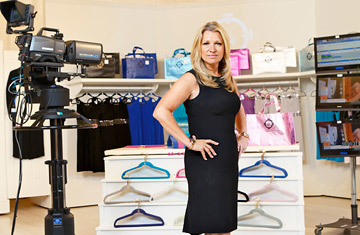
Mindy Grossman at one of HSN's studios
(3 of 4)
Not everybody at HSN understood the appointment either. One of Grossman's opening moves was the standard ploy of a house-proud woman who arrives to a state of disarray. She cleaned up. Not just by ushering old-school types like Kiviat off the air--"She's not my favorite person, but you don't need to feel sorry for me," he says from his home in Washington. "I made a ton of money"--but by actually scrubbing buildings. She had all the white walls of HSN's tree-dotted campus power-washed. And she threw out all the old chairs and bought everyone a new Aeron. "I got 100 e-mails about the chairs," she says. "It told them that someone was investing in people."
These were just the outward signs of the sprucing up she was trying to effect at HSN. It helped enormously that she was female, not just because most of her customers were but also because of who her friends were. Grossman needed better things to sell, and her girlfriends came through.
She and Greenfield had socialized for years; their husbands are even tighter. Greenfield was the brains behind the Scoop NYC chain of stores, one of the first to offer a tightly curated range of clothes, as if selling the contents of an extremely hip person's closet. She had televised one of Scoop NYC's sales and witnessed firsthand what sell-a-vision could be like. When she heard what Grossman was doing, she was the first to get on board; she persuaded some of the lines Scoop sold to give HSN a whirl. "Everybody thought I was crazy," says Greenfield. "I said, 'If you believe in me, believe in what's to come.'"
In a way, the celebrity part was the easiest. Selling on air is a natural fit for celebrities: they do what they normally do--look at cameras and talk about themselves. But Grossman knew that brands also have a tale to tell. This had been one of her frustrations in dealing with retailers in prior jobs. "The story was getting diluted, whether it was a technology story in the case of Nike or a thematic story in the case of Ralph," she says. "You lose control."
These stories needed the right context, so she hired a former British DJ to run the studio, which he fitted with sets that whispered of chat show rather than screamed of product demonstration. To give the programming more of a lifestyle feel, Grossman lured in Bill Brand, who had worked at VH1 and Lifetime.
It seems to be working. So far this year, sales are up 4% over the same period last year, when they were up 2% over the year before. Since 2009, profits have climbed more than 22%. The number Grossman hasn't been able to improve is returns: about 20% of buyers send their purchases back, even though she has a much tighter hold on quality control. (Potential vendors are always impressed by the drop test, in which a huge machine drops a product several times in its shipping packaging to see if the contents break.)
Buying from Friends
